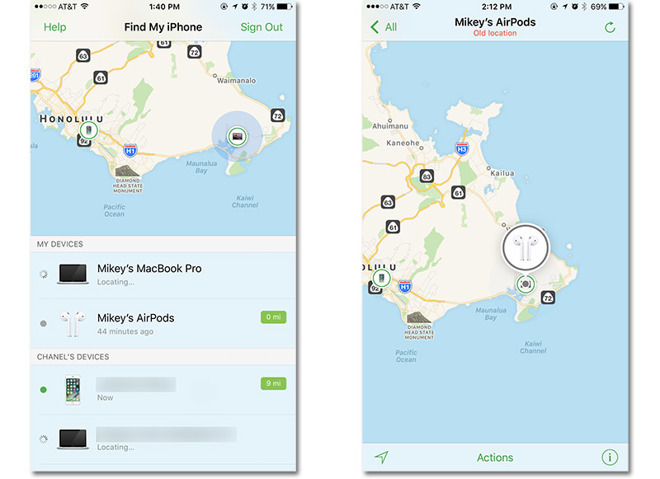Apple sued by ex-engineer over Find My iPhone patent credit, stock revocation after being fired
A former Apple engineer is suing the iPhone producer for failing to include his name as an inventor of five patent applications filed by the company, including the ideas behind the "Find My iPhone" and Apple's Passbook technology.
Darren Eastman wants to be acknowledged as an inventor for five Apple patent applications, according to filings with the U.S. District Court for the Northern District of California. Filed on Thursday, the complaint alleges how Eastman's ideas were accepted and then employed by Apple in its products and filings, but without his crediting.
A patent application for electronic ticketing is claimed to have been taken from technology developed by Eastman before joining Apple in 2006, and was declared in an Intellectual Property Agreement he signed with the company the previous year. In February 2006, Eastman told former CEO Steve Jobs about the ticketing concept, with Jobs replying it was "insanely great" and potentially able to break a monopoly held by Ticketmaster.
For the patent application relating to Find My iPhone, Eastman claims he lost his original iPhone in 2008, inspiring him to come up with a device location system. Documenting it in Apple's Radar internal bug-tracking system in October 2008, Eastman reportedly started to tell others in the company about his idea.
An initial attempt to gain support from the director of iTunes at the time failed, with the suggestion customers "would hate such a feature and feel Apple was spying on them." In 2009 he approached then-VP of iCloud Eddy Cue about the concept, realizing the need to use Apple's infrastructure for it to work, then after receiving favorable feedback, approached then-VP for iOS Scott Forstall.
Find My iPhone debuted in June 2010.
Concerned about patent protection for the technology, Eastman asked Forstall if it should be sought, then queried Apple patent counsel Richard von Wohld, but did not receive a satisfactory response. In 2012 and 2013, Apple had filed four utility patents relating to the feature, with Eastman's name not included in the list of inventors.
The lawsuit was filed "pro se," indicating Eastman is representing himself. "I'm reopening myself because my attorney had a stroke and has been in assisted living for some time," Eastman told the report. "I don't know if he'll recover to his former ability level and I ran out of money after not working since 2014."
Eastman is seeking recognition in each of the five patent applications, $326,400 in damages, $32,640 in interest, $5,000 in attorney's fees, and 735 Apple shares he believes were taken from him unfairly.
After joining in 2006, Eastman was fired on September 26, 2014, under claims of unprofessional and inappropriate communications. The issue is said to be due to attempts to solicit his manager to "do his job" to integrate a crucial fix to Disk Utility in Yosemite before its release.
It is claimed that Apple commonly fires employees in September ahead of the new fiscal year, to prevent compensation due for the current year's work from being granted, including the vesting of stock. It is alleged Eastman was supposed to receive 735 shares after taxes, which were deposited to a brokerage account on October 15, 2014, but were then retracted.
The filing also takes time to complain about changes in management style since the passing of Jobs and the shift to current CEO Tim Cook, with Eastman asserting Apple's quality standards has declined.
"Many talented employees who've given part of their life for Apple were now regularly being disciplined and terminated for reporting issues they were expected to during Mr. Jobs tenure," the complaint reads. "Cronyism and a dedicated effort to ignore quality issues in current and future products became the most important projects to perpetuate the goal of ignoring the law and minimizing tax."
Eastman continues, insisting "The executive team's main focus is eliminating tax liability and bad PR being disseminated about Apple. No corporate responsibility exists at Apple since Mr Jobs' death. There's no accountability, with attempts at doing the right thing met with swift retaliation."
In Eastman's case, he witnessed the firing of his former manager in 2014 for criticizing a project the company had failed to get going on two occasions, with the manager's daughter fired shortly after for reporting toxic mold in one Apple building.
Eastman also claims he was denied a request to manage a team he had worked with for four years in 2009, with the manager hired to lead allegedly not having a college degree or experience in management or programming. A 2013 attempt to move under a different manager was denied, with further confrontations between the two leading to a final written warning against Eastman for discourteous behavior, despite the apparent lack of first or second warnings.
After developing several disabilities while at Apple, Eastman went on leave from the company in 2013 to recover from neurosurgery. Eastman returned to work eight months later, four months earlier than anticipated, and claims to have experienced retaliation, discrimination, and unlawful termination from the company.
A statement provided by Eastman to The Register adds the most important lesson learned from Jobs was that Apple's "greatest strength has always been its employees, - many of whom make great sacrifices for Apple and deserve the same ethical treatment as if they were working for any other company."
AppleInsider has contacted Apple for commentary on the lawsuit.
 Malcolm Owen
Malcolm Owen












 William Gallagher and Mike Wuerthele
William Gallagher and Mike Wuerthele
 Christine McKee
Christine McKee
 William Gallagher
William Gallagher

 Marko Zivkovic
Marko Zivkovic









